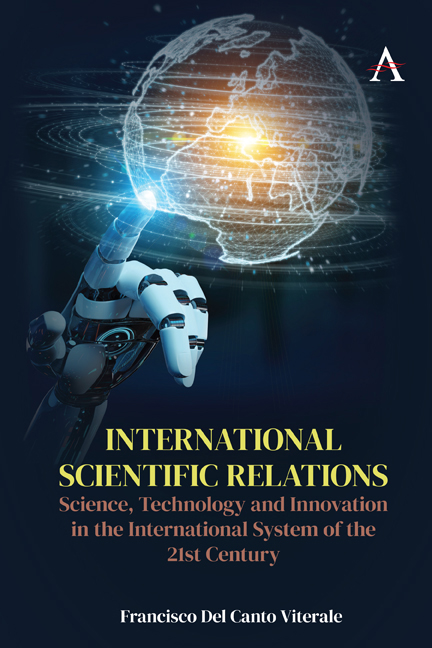 International Scientific Relations
International Scientific Relations 7 - Roles of Scientific Knowledge
Published online by Cambridge University Press: 08 October 2021
Summary
The systemic analysis of the ISR (Part 2: Analytical Framework) has revealed that scientific knowledge has a privileged place in the 21st century's international system. Without a doubt, STI has been an important factor throughout history, but in the current world order, scientific knowledge has acquired an important role that transforms it into a key resource. For this same reason, the goal of this chapter is to offer a detailed and in-depth explanation of the roles and functions that knowledge has in the field of ISR and the influence that it has on the entire international system.
As a result of the observations throughout the investigation, it is possible to consider at least five main roles that scientific knowledge has in the current context of ISR:
– as a resource for economic gain,
– as an instrument of power,
– as a mechanism of social innovation,
– as a democratizing element, and, lastly,
– as a military-strategic factor.
Resource for Economic Gain
Nowadays, scientific knowledge is becoming an essential resource for the generation of economic wealth in the current context of the capitalist economic system. Although scientific knowledge has been used in this way in the economic field at least since the Industrial Revolution, what is novel now is its absolutely central and essential role in this new economic stage as a resource to obtain economic benefits.
In recent decades, scientific knowledge has made headway as a primary resource in the capitalist economic system. Since the end of the ‘60s and the beginning of the ‘70s, a new scenery of an international, postindustrial economy started to emerge, in which scientific knowledge became one of the most relevant resources for the generation of economic gain (Drucker, 1969; Bell, 1974). Since the ‘80s, knowledge started to be considered as a key factor for growth, innovation, and the competitiveness of companies, which allowed for a fundamental change in the world economy, going from comparative advantages (David Ricardo, 1817) to the new importance of the competitive advantages(Porter, 1998, 2011). This evolution in the role of knowledge started to consolidate in the ‘90s when transnational companies started to focus their strategies on the more efficient creation, application, and expansion of knowledge.
- Type
- Chapter
- Information
- International Scientific RelationsScience, Technology and Innovation in the International System of the 21st Century, pp. 185 - 198Publisher: Anthem PressPrint publication year: 2021
